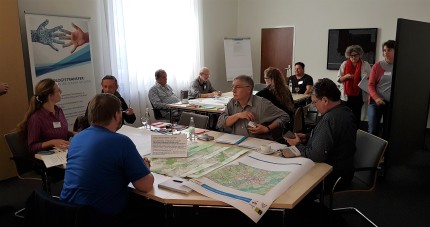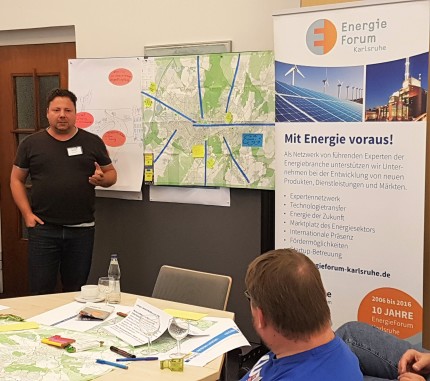Karlsruhe PILOT: Future workshop for future mobility
The URBAN INNO Karlsruhe Pilot deals with the topic ‘eBikes & Energy’ and is embedded in the celebrations for the 200th birthday of the invention of the bicycle in the Karlsruhe region and the European Mobility Week. In this context, the Karlsruhe Pilot Team organized on 16th September 2017 the event ‘Future Workshop eBikes & Energy’ in Karlsruhe City Hall to test second participatory method ‘Zukunftswerkstatt’ (Future Workshop), in addition to crowdsourcing.
Dr. Ralf Trunko from CyberForum promoted the URBAN INNO project and the background of the Karlsruhe Pilot to the participants of the event. Afterwards, the scientific partner of the pilot (EIFER – European Institute for Energy Research) gave an introduction to goals and approach of the Future Workshop. The work started with group discussions among the participants about needs in the fields of mobility, eBikes/pedelecs and the related infrastructure. In a first event module, needs with regard to the topic mobility in general have been collected and discussed (needs of different actors, local/regional mobility, etc.). During a second event module, the specific needs of two-wheelers’ mobility have been discussed. This was followed by an ‘active’ coffee break at which the participants could mark on large wall-maps their preferred bicycle pathways in the city area and where they would set charging stations for eBikes.
After this, the development of a vision for a ‘sustainable two-wheeler city Karlsruhe 2025+’ took place by further group discussions. In a third event module, ideas, suggestions and examples (e.g. which technologies and infrastructures will be available in the future) from the participants have been collected regarding their vision of an ideal situation for eBikes in Karlsruhe, with time horizon 2025+. The participants were asked to agree on 3-5 core statements (vision core).
During the last event module, the vision cores have been transferred to large posters on the tables. The visualization happened via drawings and paper cards showing the most important locations and actions in the city. During this, the questions like ‘How will we reach the desired ideal future state?’ or ‘Which needs will be fulfilled at which locations in which situations?’, and ‘How can citizens contribute to this?’ have been discussed.
Finally, the results of these vision developments have been presented by one representative from each working group and discussed by all participants in the plenum. The event closed with an outlook on how the results will be used by the Town Planning Office and the Economic Development Department of Karlsruhe. The pilot partner EIFER will analyze the results of the event and evaluate the usage of the participatory method for URBAN INNO.
Read more about Karlsruhe Pilot

Group discussion about needs in the fields of mobility

Exchanging the visions for eBikes in Karlsruhe 2025+
